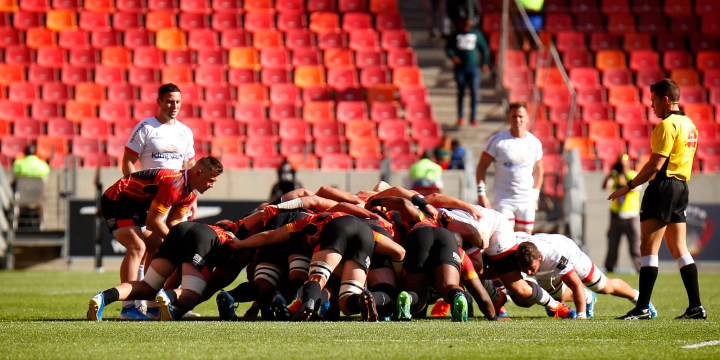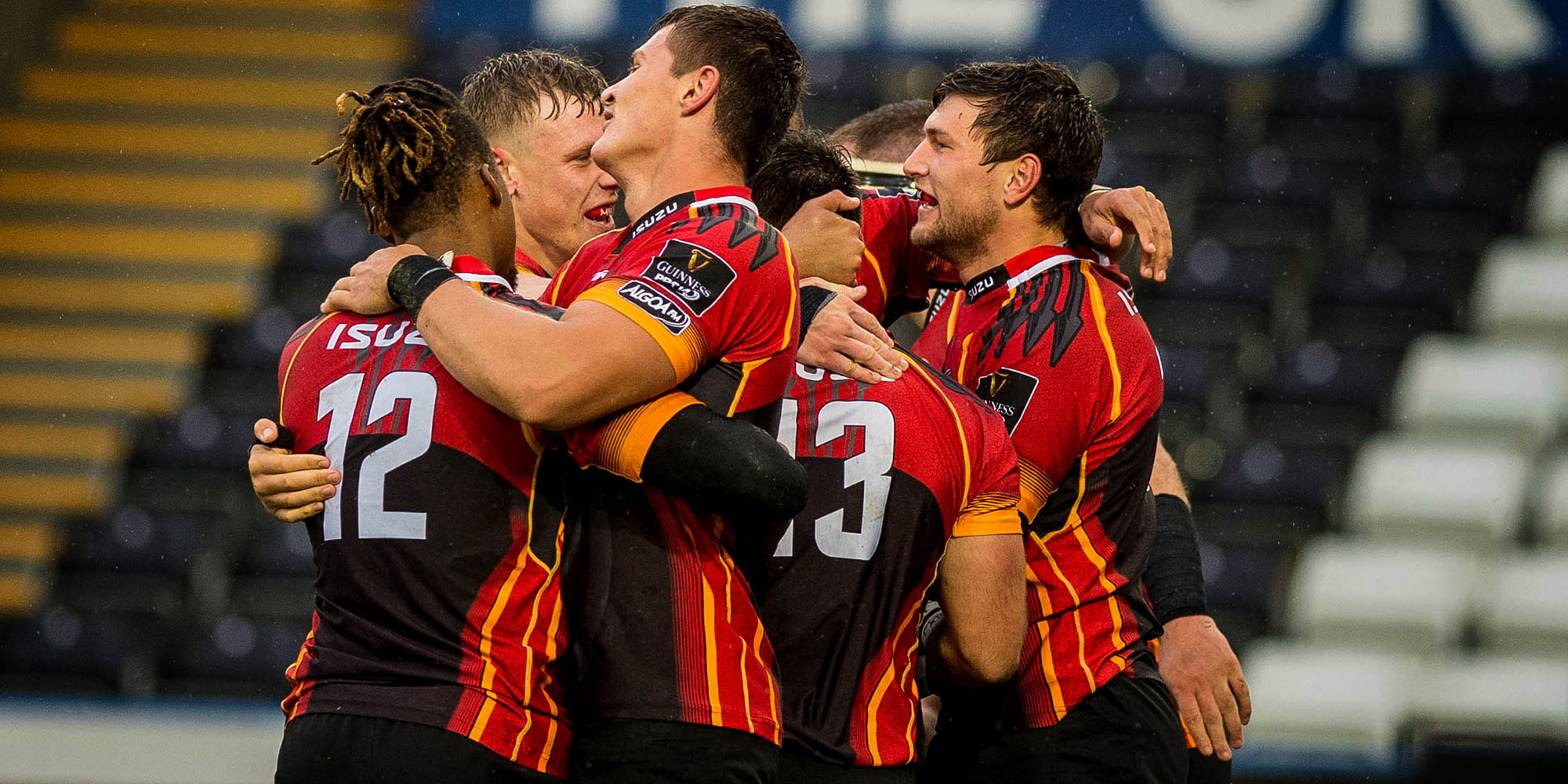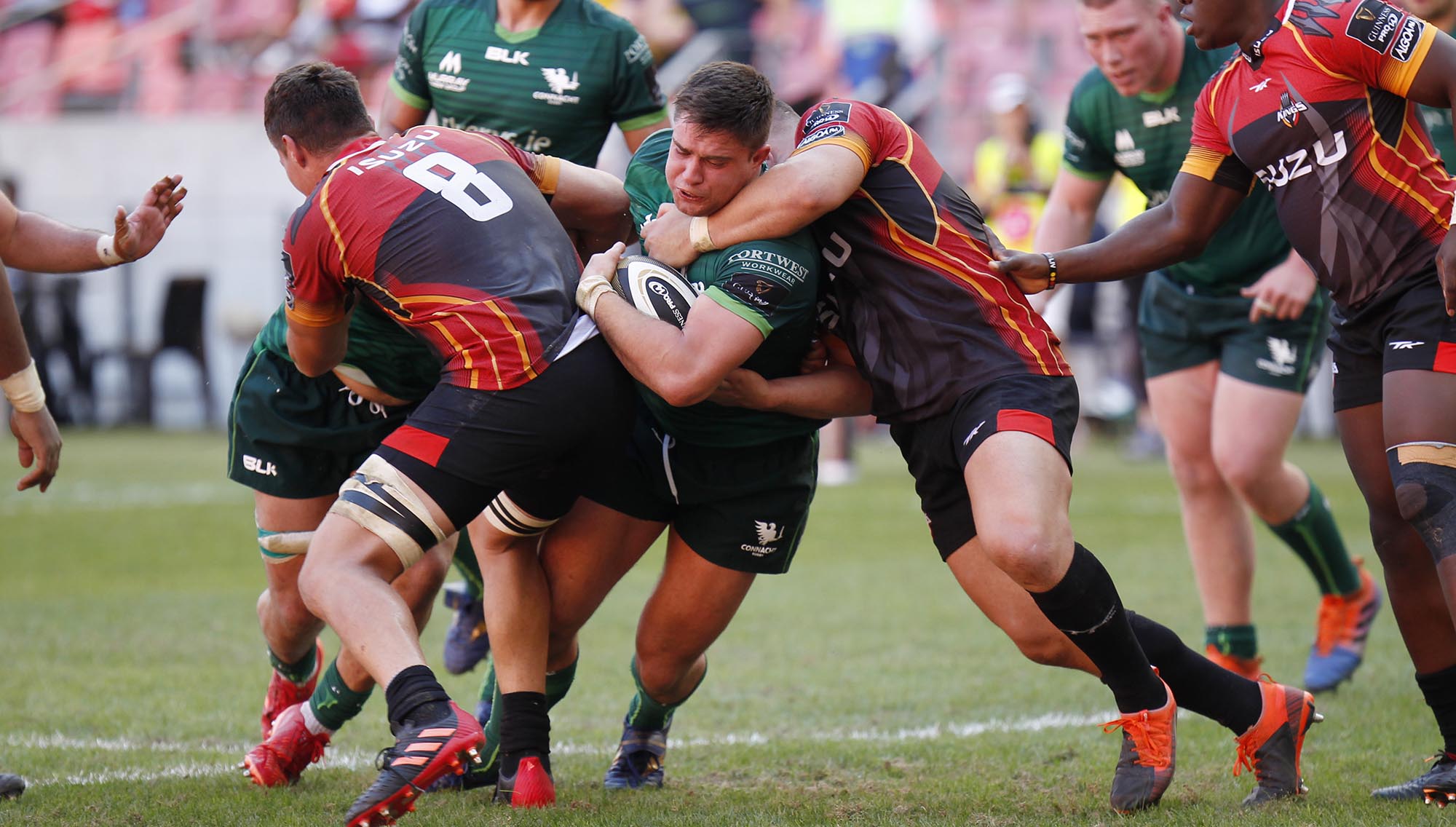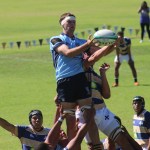Sport 168
Players hurt and destitute after Southern Kings liquidation

When the Eastern Province Rugby Union recently liquidated the Southern Kings franchise, after it accumulated debts of R55-million, it sparked a human crisis.
First published in Daily Maverick 168
Former Southern Kings chairman Cheeky Watson sold his vision for a diverse and successful Eastern Cape franchise to a lot of important people back in 2009.
“The Kings will be the best team in South Africa in five years’ time,” Watson boasted after the team claimed victory in its debut Super Rugby match in 2013. “In 10 years,” he added, “the Kings will be among the top franchises in world rugby.”
Seven years on from that inaugural victory, and Watson’s statement reads like a sick joke. Thanks to poor governance and financial mismanagement, the franchise has been liquidated and neither the Kings nor its feeder union Eastern Province will compete again in 2020.
While this raises questions about the future of the franchise – which given the prevalence of black talent in the Eastern Cape region is hugely important in the context of South Africa’s transformation goals – the immediate concern is for the victims of the administration’s neglect and abuse.
Daily Maverick spoke to Kings assistant coach Braam van Straaten as well as Kings players Bobby de Wee, Cameron Wright and Schalk Ferreira. They reveal that most of the Kings team are struggling to secure a job at a competing franchise or club, and that many of the players can no longer pay rent or support their families.
When the bombshell of liquidation first dropped, the businessmen comprising the Greatest Rugby Company in the Whole Wide World (GRC) – a consortium that bought a 74% stake in the franchise in March 2019 – walked away unscathed. The players and coaches, as Van Straaten and the rest confirm, copped the full force of the explosion.
Care4Kings
Van Straaten was the first to speak out. In the first of a series videos – which have since fallen under the banner of the “Care4Kings” campaign – Van Straaten explained how desperate the situation was for the players. He went as far as to clasp his hands together in a begging gesture.
In a subsequent video, Van Straaten – a proud man who represented his country 21 times – said that he would auction his Springbok blazer and donate all proceeds to the 52 families that had been affected by the sudden liquidation of the Kings.
“We need to give our people hope,” Van Straaten told Daily Maverick. “That Springbok blazer is important to me. It represents what I stand for. But how could I not auction it off to help someone in need? This is about something bigger than a blazer.
“We’re trying to create something that can keep people afloat during this crisis, but we’re also raising awareness,” he added. “We want to make sure that something like this never happens again.”
Three weeks prior to the liquidation of the franchise, the coaches and players were told that the Kings would cease to compete in competitions at home and abroad due to financial constraints. They were assured, at that point, that their salaries would be paid for the remainder of the season.
Six days before payday, however, the players were summoned to a meeting at the EPRU offices in Port Elizabeth and told that they would not be paid at all.
Bobby de Wee, a senior player and MyPlayers representative, as well as Van Straaten challenged EPRU president André Rademan on the decision. As the exchange grew heated, Rademan turned to his laptop and informed the coaches and players that were following the meeting on Zoom that there was nothing left to say. Rademan then shut the laptop and began to walk away.
It was at that point that De Wee snapped.
“I followed André and said, ‘Pardon my French, but this is our fucking future you’re talking about. You can’t just say the meeting is over’.
“The conversation continued in his office thereafter. André said that he couldn’t give me answers. I said that the issue wasn’t concluded. Braam agreed with me.”
Day-to-day struggle
What’s next for these players? Rademan failed to provide De Wee with answers and even now – more than a month later – the players are scrambling to find solutions of their own.
While Van Straaten’s campaign has gained support, the players still live with day-to-day anxieties and problems. Several players told Daily Maverick this life-changing ordeal won’t be forgotten any time soon.

Southern Kings during the Guinness Pro14 match between Ospreys and Isuzu Southern Kings at Liberty Stadium on November 09, 2019 in Swansea, Wales. (Photo: Aled Llywelyn/Gallo Images)
“We try to support each other. We try to stay fit and motivated. But there are nervous times, and they usually start around the 20th of each month,” said De Wee.
“You keep thinking about what’s going to happen when the debit orders start to come off on the 31st? Will you have enough money to pay the bills?”
De Wee believes that the public should know about what’s transpired and how badly the players and coaches have been let down.
“Rugby players exude a tough guy persona,” he said. “They usually don’t complain in public, they prefer to share their problems with those close to them. I don’t want to mention names, but a number of my teammates have asked me for financial assistance. They’re in trouble. Some of the players have gone back to live with their extended families because they can’t afford to pay rent or even buy groceries.”
The Covid-19 crisis and the resultant loss of revenue hit the South African franchises and unions hard. The Sharks, who were at the top of the Super Rugby table prior to the lockdown in late March, were forced to release players like scrumhalf Cameron Wright.
Wright brushed aside the disappointment and decided to pursue an opportunity with the Kings. He bought a house in Port Elizabeth and moved his wife and baby daughter down to the Eastern Cape with the intention to put down roots.
Unfortunately, the dream of a new life quickly became a nightmare.
“It’s amazing to think that the Kings [who were in a poor financial position prior to this crisis] continued to trade and engage players after lockdown hit,” Wright said. “I had heard the stories of players being paid late, but the Kings assured me that my salary would be paid. It was a reckless move on their part.”
Wright moved back to Durban after the liquidation. He said that he and his family are fortunate to have somewhere to stay while they contemplated their next step.
“It’s not ideal to go from having a job and your own home to living with your in-laws. It’s not ideal for my 18-month-old daughter, who needs a routine. But we’re in a far better position than some of the other families that have been affected.
“Springbok wing Makazole Mapimpi is no longer with the Kings, but he’s the kind of guy who will support an entire village in the Eastern Cape with his income. There are other players like that at the Kings who are playing to support entire families and communities. Guys like Yaw Penxe [who has since been picked up by the Sharks] have a lot at stake. They’re breadwinners. When that salary is taken away, it has an impact on a lot of people.
“The decisions made by those at the top have had a big impact on the coaches and players,” Wright added with some frustration. “I don’t think the people responsible actually realise what they’ve done to individuals and indeed whole families.
“That’s one of the reasons I’m speaking out. I’m willing to make my own name kak just to help.”
Van Straaten described the treatment of the players as “an injustice”. Wright echoes these sentiments.
“It’s heartbreaking to see this happen because of mismanagement and poor business. The players put their bodies on the line every week. Maybe they don’t get the results on the field, but they could not have given more in terms of physical effort. How is it that they lose out at the end of the day – when they are not at fault?”

File Photo: The Southern Kings and Connacht during a Guinness Pro14 rugby match at Nelson Mandela Bay Stadium on 1 March 2020. (Photo: Michael Sheehan / Gallo Images)
Next move
As the players consider their next move, Schalk Ferreira said that opportunities at other South African unions, and even at overseas clubs, have never been more limited.
“The timing of this liquidation could not have been worse,” the veteran prop explained. “SA Rugby has been downsizing since last year and Covid has led to further cuts. The smaller unions are effectively amateur. European clubs have got stricter in terms of recruiting players from abroad. It’s not a matter of simply hopping across now that you’re without a contract.
“I’m fortunate in the sense that I’ve been playing rugby for 15 years. I’ve had some time abroad. I’ve learned to keep some money aside for security. Some of the other guys, of course, haven’t had that chance.
“It’s sad to think about what will become of the junior guys, many of whom were earmarked to lead the Kings into a new era. Some of them will go back to varsity and play, but there’s no money in that. Where else can they go, with other teams in South Africa reducing their squad sizes and overseas clubs getting stricter in terms of foreign players?”
Overseas teams demand a certain level of experience at Super Rugby and Pro14 level. Most Kings players, who lack that experience, will not be eligible.
“I don’t think people understand how hard it is to get a gig elsewhere at the moment,” said De Wee. “Clubs judge you by your CV, where you’ve played, in what tournaments, how many caps you have at Super Rugby or Pro14 level. And even then, you have guys like [Kings scrum half] Stefan Ungerer, a good mate of mine, who is battling to get a contract. On the other end of the scale, guys with less experience may have to play for peanuts. Guys with no professional experience… it’s going to be even harder for them.”
EP’s future
SA Rugby has reached out to the EPRU. Plans are in place to include Eastern Province in a new South African tournament – the SA Cup – in 2021.
De Wee won’t be hanging around to see whether those plans come to fruition, though.
“I don’t think I can say it enough, this whole ordeal has made me incredibly sad,” he said. “I’m an optimistic guy, but this has hit me hard.
“I’m yet to confirm my next playing gig, but if the EPRU called me tomorrow to offer me a contract, I would humbly decline. I’ve seen how they’ve offered others contracts, and how a guy like Cameron Wright uprooted his life in Durban to move down to PE. I’ve seen how they’ve made promises and then failed to deliver.
“What if I accepted their offer for, say, a three-year contract and made family plans based on that? What if two months after signing that contract, I was told that they could no longer pay me?
“What if my partner was pregnant at that point? I’ve been thinking about this a lot. What’s preventing what happened before from happening again?”
Ferreira has fallen victim to the Kings’ poor leadership on two separate occasions. The well-travelled prop won’t make the same mistake again.
“I was part of the team during the Cheekygate era,” he said, referring to the former Kings chairman who is now synonymous with corruption and failure.
“Cheeky promised the coaches and players the world. There was so much talk about sponsors pumping money into the franchise. The powers that be took Cheeky at his word. I was playing in France at the time, and he offered me a three-year contract. Nobody investigated or did their due diligence.

PORT ELIZABETH, SOUTH AFRICA – FEBRUARY 09: Deon Davids, Head Coach, during the Southern Kings press conference at Nelson Mandela Bay Stadium on February 09, 2017 in Port Elizabeth, South Africa. (Photo by Richard Huggard/Gallo Images)
“When I returned for another stint with the franchise, I hoped that the powers that be had learned their lesson. I hoped that they wouldn’t make the same mistakes as before.”
Lack of due diligence
Ferreira said that the GRC should never have been allowed to run the Kings.
“The GRC projected the sort of image that inspired confidence. They comprised big businesses. The owners drove flashy cars.
“What should have drawn attention, however, was the fact that none of them put a cent of their own money or their own equity into the franchise. It was all metro funding. That’s what really gets me and the players… while we’re dealing with the fallout, these fat cats have got off without losing anything.
“SA Rugby is also to blame,” Ferreira added. “Why wasn’t due diligence done at the time of the takeover? There’s a bigger picture in South African rugby, and the Kings are a part of that.”
The players and Van Straaten are at pains to clarify that they are speaking out to make a difference. While De Wee, Ferreira and Wright are unlikely to play in the Eastern Cape again, they hope that future generations of Kings and EP players will not suffer the same fate.
“One day, when I’m old and retired, maybe I can say look back and say that speaking out led to certain people being brought to justice,” said De Wee.
“I don’t want to get caught in finger-pointing. It’s a mess. We had a lot of questions for SA Rugby regarding the way things went down. André Rademan was the guy sitting with the figures. Then there was the GRC… I suppose the respective parties may also point figures at one another, but ultimately it’s us as the players who have to deal with the failures and decisions made by those in power. Fifty-two families have been thrown into turmoil.”
EP damaged for years
Wright believes that what’s happened at the Kings over the past few months will limit growth in the region for years to come.
“The whole ordeal leaves a horrible taste in the mouth. Will players consider going to the Kings in the future? Perhaps, if the Eastern Cape rugby community could rid itself of the characters that have run the franchise into the ground.
“It would be hard to attract players to the union otherwise. There’s been a stigma there for some time. And I have to be clear, it’s a very important part of the country in terms of South African rugby.
“A large portion of South Africa’s black player base hails from the Eastern Cape. If this region could get it right at management level, the franchise could be a success. This region produces so many top players and coaches.
“Just look at how many people from the Eastern Cape are playing at other South African teams or at overseas clubs. [Springbok coaches] Rassie Erasmus and Mzwandile Stick hail from the Eastern Cape. Boks like Makazole Mapimpi, Lukhanyo Am… the list goes on.
“It actually makes you wonder. If SA Rugby are so passionate about the region and if they are aware of its importance, how could they have allowed this to happen? Could they have done more to keep it alive? Could they have put high performance structures in place? Should they have left the Kings to their own devices, or managed it like New Zealand does with its franchise teams and unions?”
The lack of a franchise, namely a team that competes in an elite regional tournament such as Super Rugby or the Pro14, could have serious consequences for the Eastern Cape.
“Rugby is part of the culture down here,” said Ferreira. “You walk into a shebeen in the township, and rugby is on the TV. It’s part of life in the Eastern Cape. That said, what will happen now that the region doesn’t have a franchise? A big part of the game in the region has been taken away.
“We need a junior academy in the region which is run by SA Rugby,” he said when asked for possible solutions. “We need private equity and ownership at a new Eastern Cape franchise.
“Look at what’s happened at the Bulls with Johann Rupert and Patrice Motsepe putting their own equity into the franchise. They’re not going to jump ship. That’s what you need to build something sustainable. There’s so much talk about how good the Kings could be, and I believe that the franchise could be successful with the right management. It will take time though.”

The Chris Burger/Petro Jackson Players’ Fund has helped over 500 injured players over the years. (Photo by Michael Sheehan/Gallo Images)
For now, the coaches and players are going out of their way to support one another. The Care4Kings campaign – an independent initiative started by Van Straaten that benefits the families who have been affected – is gathering momentum.
“I can only imagine what it means for a guy like Braam to auction his Springbok blazer – I mean that’s something anyone would be proud to have, as it represents a special achievement,” said De Wee.
“What Braam is doing won’t set those families up for the rest of their lives, but it will help out. If you can say to a family that hasn’t had regular income for three or four months, here is R10,000, it can make a difference.”
Ferreira explains why it’s been both hard and inspiring to see Van Straaten giving away his prized possessions for the sake of the players. Prominent Bok coaches and players such as Mzwandile Stick, Eben Etzebeth and Frans Malherbe have also contributed to the cause.
“There really are some good people in the Eastern Cape and around South Africa. It’s important to remember that,” said Ferreira.
“Braam’s a proud guy, and to see him producing those videos and begging people for help… it’s incredibly sad. I know that he is doing it all for the players. It’s not for his benefit.
“[Kings coach] Robbi Kempson is another who’s gone out of his way for us. He could have worked overseas with his CV, but has remained committed to serving the Eastern Cape and giving back to rugby in the region. When the liquidation happened, he tried to help the players with regards to lawyers and placements at other teams.”
Van Straaten is determined to find a solution to the problem in both the short and long term.
“I can’t just walk away from those in need,” he said. “We can’t leave a man behind enemy lines. We’ve got to look after everyone. That’s why we’re working with various partners to put together auctions and fundraising projects.
“We always hear of rugby being a brotherhood. This is a good opportunity to prove it. The response has been heartwarming thus far. It’s great to see how much people care – and I’m talking about people who are not even fans of the Kings. They’ve recognised the need for support.
“We’ve got to make sure this never happens in South African sport again,” Van Straaten added. “We’ve got to make sure that codes like rugby look after their coaches and players so they don’t find themselves in such a situation.
“We’ve got to be positive and hope that the phoenix will rise from the ashes, stronger than it ever was before.”
It’s a sad story that many believe is destined for a final and bitter ending. And yet, when one sees how the players have come together in the face of adversity, and how the community has shown its support, it’s hard to deny that there are good people out there who want this potentially great franchise to succeed. DM168




















 Become an Insider
Become an Insider
Comments - Please login in order to comment.